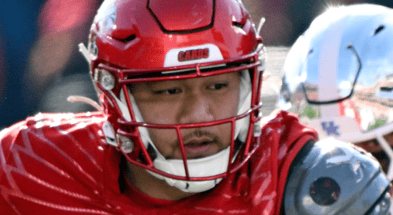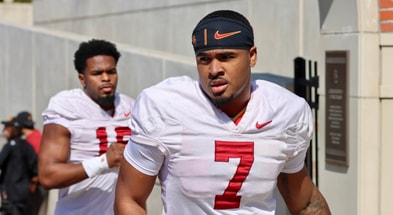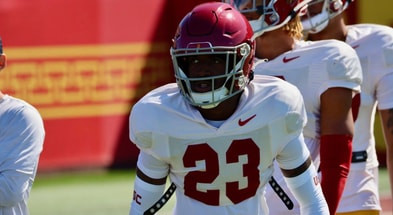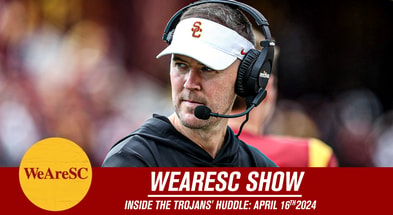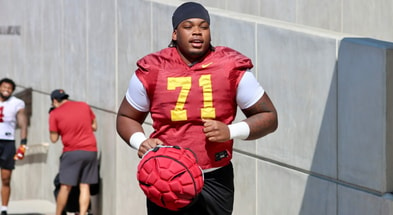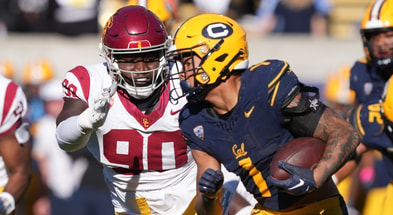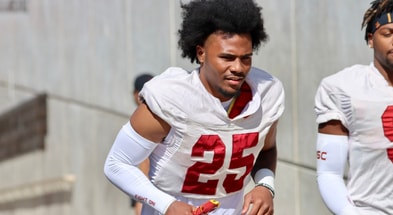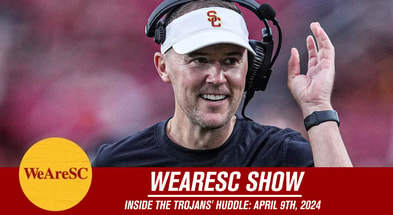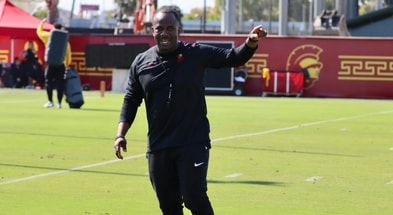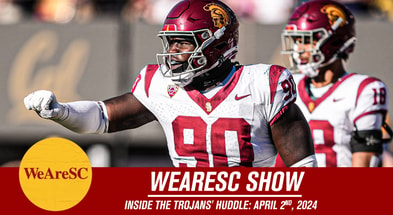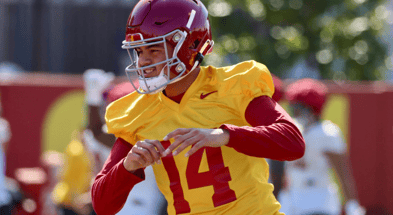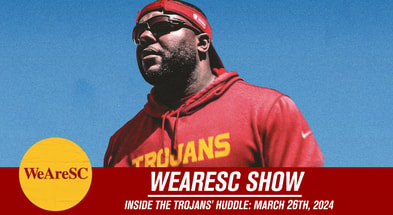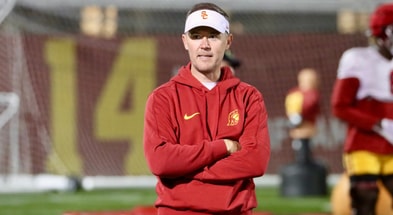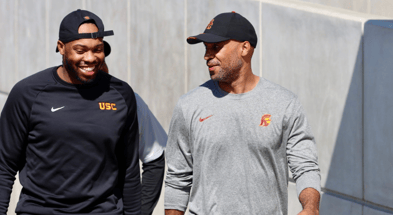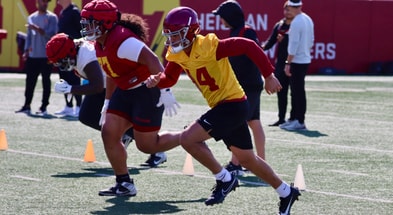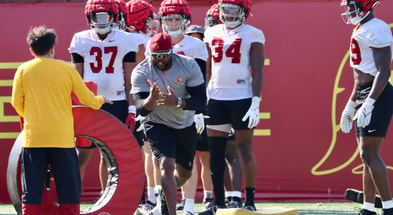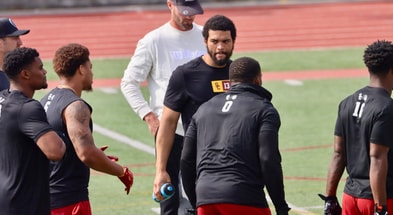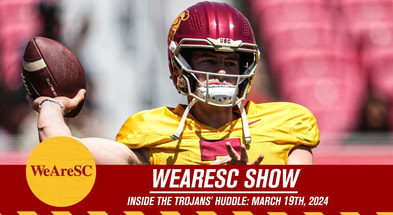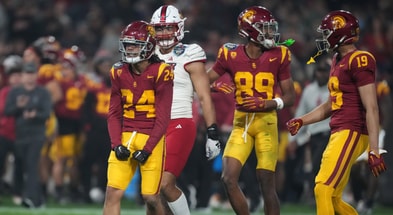Musings from Arledge: Another Look at USC's NIL, and Brushing Up on Football-Watching Etiquette
Last week I wrote about USC’s NIL plans. My basic thesis was that USC was playing a different game than Texas A&M, Miami and some of the others, that USC was selling market-value endorsement opportunities and the others are selling bags of cash, that USC was selling potential (since its program is not up-and-running) and the others were selling, again, actual, existing bags of cash. I expressed skepticism that recruits are interested in passing up large bags of cash and that USC might be in for a bumpy ride on the recruiting trail unless they change their perspective.
I meant no disrespect to the recruits, of course. It’s not unreasonable to say yes to bags of cash. I certainly don’t intend to pass up any, should they be offered. We all have our price. For a big enough check, I’d even be willing to write for an Oregon Ducks site. It might even be fun. This is an exciting time for Oregon. It’s been a long time — the University of Chicago in the last century, I think — since a major college program fell down into the lower ranks and let its competitors move on without it. Think about it: I could live journal Oregon’s plummet into the ranks of small-college football. Like Oregon coach Dan Lanning, I played at William Jewell College and share his love for the lower divisions. Someone should capture for posterity Oregon’s transformation into the new University of Chicago. I mean, minus the prestige, academic reputation, tradition of excellence, and Nobel laureates.
Sorry, I’m getting distracted. After publishing the NIL article, I had a chance to speak with Spencer Harris, who was a member of USC’s football staff for the last few years and is now heading up BLVD, the organization that will run USC’s NIL plan. After talking to Spencer, I want to provide some updates and a correction — essentially, I want to give you BLVD’s response to my criticism. (Clay, I would have done this for you, too, if only you had asked. But I still would have made fun of you.)
Let’s start with the big picture: my assertion that USC is playing a different game than some of these other schools is only partially true. It is true that USC is not willing to engage in pay-for-play schemes with recruits, where we promise X dollars in exchange for a signature on a letter of intent. USC believes that would violate NCAA rules, and while we should all be skeptical that the NCAA would be able to enforce its rules at this point, USC believes that (1) you never really know what will happen if you violate the rules, and USC has a track record of getting targeted and punished even if others are engaging in rule violations with impunity, (2) we should behave honorably and follow the rules we agreed to follow, even if we could likely avoid punishment for violating them, and (3) USC doesn’t need to engage in pay-for-play schemes with recruits, because we can be successful operating within the rules.
It’s the last assertion that gives me some pause. What, exactly is USC’s plan to compete without offering pay-for-play to recruits? Part of it is helping USC’s athletes find endorsement deals with businesses, Caleb Williams’ deal with Beats (which Williams landed all by himself) being a well-known example of this type of opportunity. Those are the sorts of opportunities I asserted USC wanted to help its athletes land. And they do. But Spencer was clear that this is not the extent of USC’s plan, and therefore I’m going to correct that portion of my article implying that USC was focused only on those types of opportunities. Spencer says that from the very beginning, USC’s intent was to have the most aggressive collective in the country. USC plans to raise $75 million over the next five years through donations to a membership program and through traditional third-party sponsorships, merchandise sales, and original content creation. This money will be used to compensate its athletes, and if USC meets this monetary goal, its program should be the equal of any competitor. Football players will not be forced to turn down USC because other teams are offering more compensation.
Again, USC will not promise recruits a particular sum in exchange for a signature. But recruits will obviously have some understanding of what USC offers. They will know, for example, what players on the USC roster are getting, and they will likely have some idea what their own value would be based on that. For example (my example, not Spencer’s), a five-star wide receiver in the recruiting class after Zachariah Branch would understand what Branch received and would have a reasonable understanding of the type of compensation that a player of his caliber at his position can command. He will not have to operate on blind faith.
The question remains whether the late rollout of USC’s plan puts USC at risk during this recruiting cycle. Spencer agrees that it has taken longer to get USC’s NIL plan in place than was intended for a whole variety of reasons, including the need to work with key members of the USC administration, the legal team, Coach Riley and staff, and various unanticipated hurdles. My view is that being late to market is seldom a good thing, and if you are later to market, it better be because you are developing a better widget than everybody else.
For what it’s worth, Spencer is not convinced that USC’s later rollout will hamper this year’s recruiting efforts. I think it’s fair to say that USC would not have landed the verbal commitments it has without a strong belief by recruits that USC is offering (or will be offering) fair compensation opportunities (see bags of cash, desire for, above), and it’s almost certainly true that where USC has missed out on recruits, it’s probably not entirely an NIL issue.
But time will tell whether Spencer’s optimism is justified. If Malachi Nelson decommits in pursuit of Aggie dollars, Spencer’s statements will not have aged well. For now, we can only watch and wait.
One last thing: some troublemakers — maybe from places that are wet and moldy, have no history of football tradition, and are likely two years from being in the same conference as San Jose State — have implied that USC players are unhappy because promised NIL deals are being breached. This is apparently not true. It is true that at least in one case an expected NIL deal was slower to develop than expected and the player expressed some concern. But that matter was quickly resolved to everybody’s satisfaction and there is no lingering issue. Nor is there a program-wide issue of unsatisfied expectations. Spencer says that claims to the contrary are inaccurate.
At the Big 10 media day, Ryan Day said the following about expectations for his program:
“Maybe at some places 11-2 with a Rose Bowl victory is a good year. It isn’t at Ohio State. Our three goals are beat the team up north, win the Big Ten Championship, win the National Championship. That’s our goals, and those things didn’t happen last year.”
I don’t know if Ryan Day really believes that. Maybe he just feels compelled to say it so the fans will be happy. But I’d note that, if this is true, Ryan Day, who is 34-4 at Ohio State with two playoff appearances, has never had a good season.
Think about the pressure that entails. These guys make a lot of money, and if you’re coaching at Ohio State (or USC), you have lots of advantages over almost every school on the schedule. But that’s still quite a burden to carry.
I’d also note the difference between a competent coach who understands the expectations that come with an elite coaching job and of a coach who doesn’t deserve such a job. Ryan Day never brags about playing for a championship when he makes the conference title game.
It feels good to see that recruiting momentum continue. Pulling elite prospects out of Texas is the sort of thing that USC should do but hasn’t done much of lately.
Let me close with one of my monologues from our YouTube program, Inside the Trojans Huddle. For those who watch our show, you’ve seen this already. For those who don’t, these are the sorts of critical public service messages we’re delivering on a weekly basis. Please watch and stay informed.
Over the past few years, we’ve gotten sloppy, and for good reason. I used to plan my schedule around USC football. There were 12, sometimes 13, holy days. Those days were not to be interfered with. If somebody wanted to do something on those days, they could. They just weren’t to ask me to participate. Especially, especially, if it was one of the two High Holy Days, the days of the Notre Dame or UCLA games.
I like to think I’m an understanding guy, though I may not sound like it for the next few minutes. I am able and willing to tolerate a great many things. I have a big, kind heart. But some things are just not right. And planning something on a Holy Day is not right.
In recent years, I’d still watch the games, of course, but it was different. It became a chore. It was an obligation and no longer a labor of love. And for that reason, I became sloppy in my football-watching habits, and I allowed those around me to become sloppy in their football-watching habits.
Well, times have changed, and it’s time to get serious. It’s time to lock it up.
I have been nominated by the die-hard USC football fan in your life to deliver the following public service announcement. Some of it will sound harsh. I don’t mean it to be, but I do mean for you to take it seriously. Because it’s important.
I want to talk to you about football-watching etiquette. Some of you know these rules already, but a little reminder never hurt.
Some of you don’t know them at all. Or you know them and choose to ignore them. Either way, I’m going to need you to listen to this. And I’m going to need you to modify your behavior accordingly.
First, significant others, a USC football game is not the time for a couple’s date. And I mean any kind of couple’s date. We are trying to focus on the game. We don’t care that you think that we’d like Susan’s husband. We don’t care if Susan has been saying for a long time that the four of us should get together. We don’t care that they’re free Saturday. We don’t want to, and it’s not right to ask. It’s game day. You’re better than that.
And believe me when I say we’re doing this for your own good. Because if a Pac-12 official makes a terrible call — excuse me, when a Pac-12 official makes an inexcusable call — we’re going to yell at the television, and the veins might come out of our necks just a little. I might throw the pillow that sits next to me on the couch. You know this. You also know that nobody’s in danger. You don’t need to call for help. But do you really want to Susan and, God help us, Susan’s kids to see us acting that way? Do you want her to hear me say, when I’m not in my right mind, that I’m glad the other team’s free safety is holding his knee and that he probably deserves it. You know there are things I think and sometimes say that the outside world should not be privy to. So come on. Make a wise decision. Choose another day. Don’t argue. Don’t try to change our minds. Just choose another day. You can punish us with a couples dinner some other time.
And please don’t invite a fan of the other team over to watch the game. Yes, maybe we do have a good-natured rivalry with that person. Maybe we genuinely like them. Maybe we joke around and it seems like everything is okay. And it is. On any other day. But if you invite that Notre Dame fan over to watch the USC-ND game, there’s a chance that things will not be okay. If the Irish score, and if things are going south, and if that stupid leprechaun is dancing, and if that friend of ours who loves the Irish has a big grin on his face and is humming Notre Dame’s victory march, there’s a good chance that, for that brief moment, I will hate him with the burning intensity of a thousand suns. I don’t want to be in that situation. You shouldn’t want me to be in that situation. He can watch at his place or he can watch with all his fellow Notre Dame friends down at the local prison. But I don’t want him here. Not today. And I need you to understand that.
Listen to me: The right people should be in the room. And only the right people.
Now let’s talk about proper etiquette for those actually in the room.
Don’t talk about other stuff. I don’t care if you saw a great queso recipe. I do not care what Jill said at work. I’m not interested in your new moisturizer. And if you want to tell us how football is inferior to soccer, the beautiful game, most of the time I can hear that and just shrug it off. Sure, I’ll think less of you as a person, and I’ll know that you always pee sitting down, but you can say it and I’ll tolerate it. On other days. But don’t you dare, dare make a comment like that to me during a USC football game. If you do, somebody better have a red card present, because we’re going to need it.
Please understand, I’m not saying you shouldn’t discuss those other things. I’m saying there are other times for those conversations. In fact, there are 8,760 hours in a year. If USC plays 13 football games, only 39 of those hours are filled with a USC football game. Literally, you have the remaining 99.55% of the year to talk about those other topics. Even that soccer nonsense if you want. But that stuff can wait. Don’t do it here, and don’t do it now.
Can you talk about the game? Of course. Can you ask questions about the game? Yes. But let’s be selective. Now is not the time to ask what holding is. You should know that already. And if you don’t, you should look it up on your smart phone quietly — this is why Google was invented — or you can ask the question on a Tuesday evening. This is game time. This is not the first day of an Intro to Football class. This is not a remedial lecture on football for foreign travelers who have never been exposed to the game. Game time is not the time for that nonsense.
So, yes, we know it looks like we’re just running the ball right into a big crowd of their guys, and we know you think the guy with the ball should run around them instead of running right into them. We know you think this. You’ve said it before. But this is not the time to explain to you the importance of an inside running game. It’s not, and you just need to accept that.
It’s 39 hours, people. That’s it. 0.45% of the year. This is not too much to ask. So please, please, respect us, respect the game, respect yourselves, and follow the rules.
